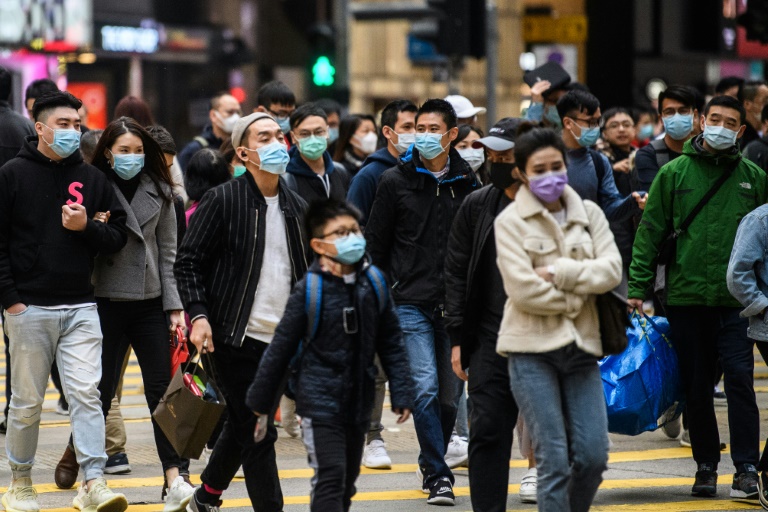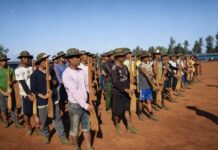When novel coronavirus exploded with a vengeance in China’s Wuhan, Hubei Province, the first worry for the people of Burma or Myanmar is that how to seal the long border of some 1700 kilometers that the country shares with China, in order to coup with the new contagious disease, which still has no remedy or cure of the disease yet.

As of this writing, over 20,900 have now been confirmed infected with 429 deaths. It has spread to 27 countries and the Philippines and Hong Kong have one death count each which were confirmed with coronavirus infection.
According to Myanmar health department there are seven suspected coronavirus infection, who are quarantined, under surveillance and still need to be verified if they are infected with the disease.
Many are worried as Myanmar shared hundreds of kilometers with China, with at least 30 official border-crossing points and the same amount of unofficial ones, which will be impossible to seal, according to Dr. Than Sein, Chairman of the Public Health Foundation, in his discussion with the RFA weekly forum, on February 1.
Myanmar have four major trading posts, Muse, Loije, Chin Shwe Haw and Kambaiti, besides Panghsang and Mongla, the former controlled by United Wa State Army (UWSA) and latter National Democratic Alliance Army (NDAA), also known as Mongla.
UWSA on January 26 shut down the entertainment centers in its autonomous territory, which borders China, as part of its effort to prevent the spread of the coronavirus. Strict measures checking on the people crossing through its border gates were carried out and it also barred large public gatherings and urged people to avoid unnecessary travel. It urged the people not to consume wild animals and a temporary ban on the trade of wild animals was imposed. Trading with wildlife is prohibited to avoid spreading of coronavirus and to block potential sources of infection and transmission, reported Myanmar Times on January 27.
Meanwhile, the NDAA authorities in charge of Mongla also issued a six-point announcement February 1, stating:
- Sidewalk eating facilities like barbecue, hotpot and all food shops have to be closed until further noticed.
- Other restaurants and eating facilities are allowed to operate but disinfection and disease prevention measures have to be undertaken in order to operate.
- Restaurant employees must wear gloves and protective masks.
- Hand-wash facilities must be installed where they are visible and customers are to be told to wash their hands before consuming.
- Disinfectant must be sprayed in the restaurant.
- If customers are from the infected areas, authorities have to be informed.
While Kachin Independence Organizations/Army (KIO/KIA) which controlled many border-crossing checkpoints made no announcement publicly, the Kachin government’s health department of Dr. Zet Lum Hkawng, who heads the expanded protection of contagious disease said that there are currently no confirmed cases of coronavirus in Kachin State or elsewhere in the country, according to the Network Media Group recent report.

Global Map
“Our medical staff from Kachin State’s public health department have carried out medical checks at border gates such as Kambaiti in Waingmaw Township, Panwah in Chipwi Township and Loije in Momauk Township in Kachin State. We have monitored patients with a high fever. We are functioning in line with the directive,” he said.
On January 31, Myanmar President’s Office announced the formation of a special committee to tackle the coronavirus chaired by the Union minister for international cooperation and the minister of health and sports.
The Central Committee formed one day after the World Health Organization declared the coronavirus outbreak to be a global health emergency is said to enable a quick reaction and coordinate the responses of ministries and departments if the virus is found in the country. The committee is made up of the chief ministers of all states and regions, and the vice ministers of information; defense services; border affairs; transportation; hotels and tourism; education; commerce; and finance and planning.
The committee will coordinate the activities of each institution to monitor and control the spread of the virus, and to provide timely information about the virus to locals and foreign tourists, as well as travelers leaving the country, according to the President’s Office directive.
Furthermore, the committee would issue safety measures to be followed by members of surveillance teams at international airports, border checkpoints, ports, hospitals and health centers, including ensuring that the public receives accurate and up-to-date information and would follow both internal health regulations and protocols established by the World Health Organization (WHO) and the International Civil Aviation Organization to prevent, treat and control the coronavirus.
Shan Herald Agency for News (SHAN) gist reports concerning the coronavirus are filed as below.
On January 28, thousands of Chinese people have canceled trips to Muse, Shan State, on the border with China, due to fears of the spreading coronavirus.
According to locals in Muse, some 10,000 Chinese nationals visited the border down during the Lunar New Year period last year, and a similar number were expected this year.
“Nearly 8,000 Chinese tourists usually visit Namkham and Muse towns during this period,” tourism business operator Sai Hla, told SHAN, adding that he had been told that at least 4,000 people had called off their travel plans.
On January 30, because of the spreading coronavirus in China, fruit wholesalers in Muse, on the Shan State-China border have been asked to temporarily stop exports to Burma’s northern neighbor.
Sai Khin Maung, chairperson of the local Wholesalers’ Association, said that it is difficult to send vehicles across the border with goods to sell.
“Chinese officials have strictly tightened security at the border entrance gates. Transportation is really difficult at this moment,” he told SHAN.
Again on January 30, some 200 people, mostly immigrant workers, were returning daily, according to Sai Kyaw Thein, who is a MP in Shan State parliament.
On January 31, SHAN reported that the Myanmar government has closed the Myanmar-Thai border checkpoint gates in eastern Shan State, due to the infection danger of coronavirus. They are Chiang Dao-Pongpakyin BP1, Fang-Na Kongmu Parchi, Wiangheang-Mongtaw Lattaeng, and Mae Ai-Mong Hsat Nam Yone gates.
On February 2, the event organizing committee for Shan National Day in Muse said that the 73rd anniversary of the day will not be commemorated in the Shan-China border town this week, due to the coronavirus epidemic. Shan National Day is held annually on February 7.
“We won’t commemorate Shan National Day here in Muse this year,” organizing committee member Sai Myat Aung told SHAN, referring to the occasion by its previous name. “Now the Wuhan virus is being spread. If this virus infects people here, we don’t have the medical tools to do medical checks. It’s difficult to treat this disease. That’s why we won’t hold the commemoration of Shan National Day.”
Meanwhile, the NGOs are raising alarm over the returning Myanmar workers from China as some could be infected with coronavirus, reported Myanmar Times recently.
Reportedly, most of the workers returned after the owners of the business establishments did not return after the Chinese New Year celebration, apparently due to travel restrictions imposed by the Chinese government. Most of those who returned home are working at factories, restaurants, constructions, and farms. On February 1, over 150 Myanmar workers and their children returned from China through the Sin Phyu gate in Muse town of Shan State.
The returnees were from Taunggyi in Shan State and also from Kanbalu and Monywa townships in Sagaing Region.
About 20,000 Myanmar citizens who pass through the border gate daily via Muse to work in China, and about 100,000 illegal workers also cross the border, according to the figures of Police anti-trafficking in persons group.
It looks like, the danger of spreading novel coronavirus is more likely to happen through border-crossings of Shan and Kachin states than airports in Myanmar, as the surveillance are loose in comparison, and the country lacks medical tools to identify the virus and also there is no cure in sight, at least for a few more months if not longer.
So far, only two ethnic armed organizations, UWSA and NDAA have taken some measures to protect their population and they are hardly efficient.
Moreover, Myanmar still has to benefit from WHO’s help to coup with the surveillance and appropriate quarantine measures, including acquiring protective equipment and necessary medical tools.
And with thousands of immigrant worker returnees filtering back to their homesteads unchecked, it could become a big headache to control and contain the disease, while the search for the cure of navel coronavirus is going on frantically.
For the time being, WHO’s basic protective measures against the new coronavirus would be the most reasonable guidelines that all should practice, such as: “washing hands frequently; maintaining social distance for at least 1 meter with people who are coughing; avoid touching eyes, nose and mouth; if having fever, coughing and breathing difficulties to seek medical care; if mild respiratory symptoms with no travel history to or within China occurred, to practice basic respiratory and hand hygiene and stay home until you are recovered; as a general precaution, practice general hygiene measures when visiting live animal markets, wet markets or animal product markets; and avoid consumption of raw or undercooked animal products.”












Leave a Comments